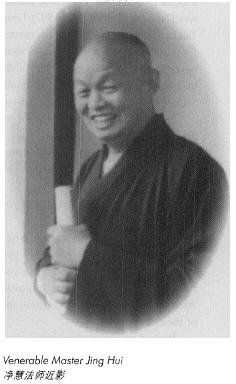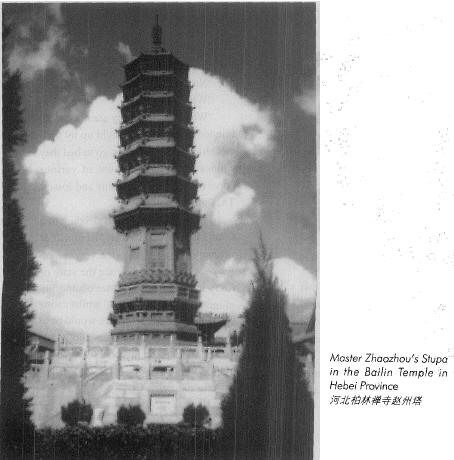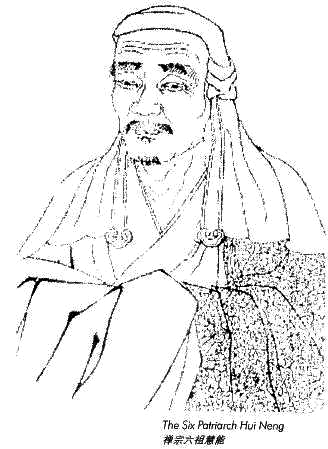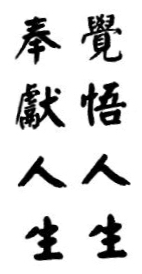What is the Sheng Huo Chan of Buddhism? Please listen to how Master Jing Hui presents it to contemporary people.
什么是佛教的“生活禅”?请听净慧法师如何对当代人说禅。

In
the 1990s, based on his genuine knowledge of truth and deep
understanding of the problems contemporary people face, Master Jing Hui,
Vice Chairman of the Buddhist Association of China, Chairman of the
Buddhist Association of Hebei Province, and Abbot of Bailin Temple,
presented the Sheng Huo Chan (the contemporary Chinese spelling of the
accepted word "zen") to teach and spread the Chan tradition in the
Bailin Temple.

What is the Sheng
Huo Chan.? It is to take the spirit and wisdom of Chan to be in perfect
harmony with life so as to embody in everyday life the transcendence of
Chan, the spirit of Chan, the artistic mood of Chan and the elegant
demeanor of China. The Chan School
came into being through the mutual blend of Buddhist culture with
Chinese culture, featuring a principal part of typical Chinese culture.
The essential aim and object of Sheng Huo Chan is to "lead an
enlightened life, and a life of service." The Fundamental criterion for
the Temple to deal with all sorts of day-to-day matters are to be "accepted, participated in, fulfilled and shared by everybody."
Our life is
full of the atmosphere and crux of Chan. When we mention in the saying
that ``the power and application of Chan” we find their expressions in
carrying water and chopping wood. The majority of us, however, are so
self-absorbed that we do not realize our inherent potential to
experience Chan. This is known as "ordinary people never bother to know
what they use daily." Now, let's look at two parts of a story in which
the ancients used everyday life as a turning point to talk, comprehend
and practice Chary. Hopefully, they will help us understand the Sheng
Huo Chan in depth.
In
the late Tang Dynasty, there was a monk named Long Tan whose master was
Tianhuang Daowu (748-807). Long 'fan had been mattendant to his master
for quite a long time . As the days went by, he realized that his master
had never gold him the essence of Chan training. So , one day, Long Tan
said to his master:
"Since
I came here, you have not yet told me the essence of Chan." His master
replied, "I have never failed to show you the essence since you arrived
here. " Long Tan asked," What all that you have shown me? "

His
master then remarked. "When you make tea for me I take it; when you
serve me a meal I eat it; and when you pay obeisance to me I nod in
approval. Aren't all those matters demonstrations of the essence?"
Pushed by his master into a deep corner in which he slowly turned
everything over in his mind, it was at this instance that Long Tan
attained full enlightenment, realizing his own Buddha nature. Then, long
Tan once again asked his master for further advice:
"How can I maintain the state of enlightenment?"
His
master replied with the following stanza: "Conduct oneself in a natural
and carefree way. Let everything go as it is. Free from all
attachments. That alone ensures full enlightenment."
This
piece of the story clearly tells us a simple truth: Those engaged in
Chan training live a life suffused with the crux of Chan. It is only
after they have whole-heartedly thrown themselves into such a life that
they will come to comprehend the crux of Chan everywhere and experience
the state of Chan everywhere. Of equal importance, this piece of the
story also teaches us how to keep the state of an enlightened
Mind——"Free from all attachments. That alone ensures full
enlightenment."
The key to experiencing Chan in everyday life is to keep one's original
Mind. The next piece of the story with all its profound implication,
might help us to learn how to keep the original Mind in everyday life.
Once, Master You Yuan, who was a Vinaya master, asked master Hui Hai: "Do you make efforts in cultivating the way?"
Master Hui Hai answered: "Yes!"
You Yuan asked again, "How do you make efforts?"
"I eat when I feel hungry and I go to bed when I feel sleepy."
"Everyone does the same as you do. Does it mean that they make efforts as well as you do?"
“No."
"Why not ?"
"When they eat, they are not single minded in eating but caught up by
various anxieties. When they go to bed they cannot fall asleep because
of various concerns for personal gains and losses. That 's the
difference."

The
way of eating and sleeping of a Chap master differs greatly from that
of ordinary people. This is the very reason why we cannot experience the
state of Chars in everyday life. If we could truly eliminate those
"anxieties" whilst eating and "concerns" in sleep, we would be as good
as the ancient misters and would be at peace in the moment.
(责任编辑:伍彬)